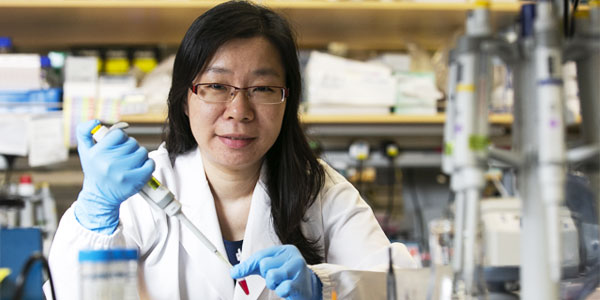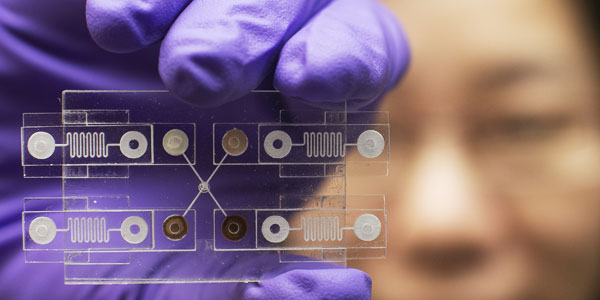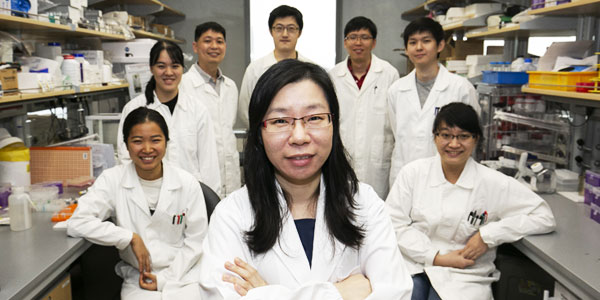FACES OF A*STAR
In pursuit of the “holy grail” in diagnostic technology

A*STAR scholar, Dr Shao Huilin, is combining the worlds of physics and biology to create disease diagnostic tests that are not just cheaper and less painful, but also allow clinicians and patients to make better treatment decisions.
For years, Dr Shao Huilin and her team racked their brains to develop a test that could tell breast cancer patients the aggressiveness, stage and molecular information of their tumours – just from a tiny extraction of cells and tissue through a biopsy.
Traditionally, such information could only be obtained after the tumour was removed from a patient’s body, while initial biopsies could only provide basic information, such as whether a tumour was malignant or benign.
Due to the lack of information, patients sometimes opt for more extensive treatment than required, such as the removal of the entire breast.
“I wanted to come up with a way to reveal as much information as possible at the biopsy stage, not only to help clinicians in their decision-making, but to also relieve patients of unnecessary anxiety,” said Dr Shao, a Joint Investigator at the Agency for Science, Technology and Research’s (A*STAR) Institute of Molecular and Cell Biology (IMCB), Assistant Professor Department of Biomedical Engineering, National University Singapore (NUS) and Principal Investigator Institute for Health Innovation & Technology (iHealthtech), NUS.

The new Sequence-Topology Assembly for Multiplexed Profiling (STAMP) technology.
Their hard work paid off when they developed a technology that could provide all the critical information in just two hours – compared to the weeks needed for conventional methods.
Called the Sequence-Topology Assembly for Multiplexed Profiling (STAMP), it works by generating 3D DNA “barcodes”, which when exposed to patient cells, reveals the proteins that are present and their locations in the cells. This information determines if cancer is present, its subtype and aggressiveness.
The stepping stone to a scientific career
Dr Shao was drawn to science from a young age because of its objectiveness and ability to provide an explanation for the phenomena around us. She knew that a PhD degree was necessary, to equip her with the training required to realise her dream to be a scientist.
At 18, she was elated to receive the A*STAR’s National Science Scholarship.
“A*STAR’s scholarship programme was the only one that could help me fulfil this aspiration – to carry, mentor and facilitate the experience required for a student, from the undergraduate to PhD level,” she shared.
At A*STAR, scholars get to do a one-year research attachment at the institutes of their interest after their undergraduate studies, and are offered research positions once they obtain their PhD.
She was also introduced to mentors who widened her perspectives, honed her research skills, and furnished opportunities to participate in internships that allowed her to zero in on the field that will become her career – diagnostic technologies.
Studies in the different fields allow me to understand the patterns of the world better.
Aside from breast cancer research, Dr Shao has also developed an accurate and less painful method to screen for Alzheimer's disease, the most common cause of severe dementia. This method is capable of detecting reflective biomarkers in blood samples that indicate early-stage Alzheimer's disease.
More significantly, the test is 100 times cheaper than a brain-imaging scan – and could reach mass consumers as early as within five years.
For her work, she received the Young Scientist Awards 2019, administrated by Singapore National Academy of Science and supported by A*STAR.
The experiences gained continues to drive her work as a principal investigator.
“The local and overseas education and research landscapes can be very different. The internships helped me to understand the local context and the key research strategies that Singapore should be focusing on, in order to keep the country abreast of the international competition,” she added.
Camaraderie of PhD life
Reminiscing about her post-graduate days, Dr Shao is thankful that she had close friends and housemates, who were fellow A*STAR scholars. She believes that having a strong network of like-minded friends helped her cope with the years of endless experiments and long nights she spent awake because of them.
“A PhD programme is a very tough process. Many things can happen – personal changes, work uncertainties and so on,” she said.
Her aspiration, however, remains clear: to impact the lives of patients. She hopes that the tests she has developed will be commercialised soon and become a new standard procedure in clinics, helping clinicians to diagnose diseases earlier and prolonging patients’ years of good health.
Her team has received emails from members of the public wanting to be a part of their clinical trials, as well as notes of thanks and encouragement from patients who have benefited from these new technologies.
“What drives me is the fact that we are not only making cool technologies in the lab, but also improving outcomes for patients,” she said.

Dr Shao’s team members from IMCB, from left to right: Chen Yuan, Wong Chi Yan, Nicholas Ho Rui Yuan, Zhang Yan, Pan Si Jun, Noah Sundah, Natalia Auginia.
Keen to pursue a career in STEM? Start your journey with an A*STAR scholarship today!
Was this article helpful?
A*STAR celebrates International Women's Day

From groundbreaking discoveries to cutting-edge research, our researchers are empowering the next generation of female science, technology, engineering and mathematics (STEM) leaders.
Get inspired by our #WomeninSTEM
